Key takeaways:
- Personal branding shapes perceptions and can influence career opportunities significantly.
- Identifying your unique value proposition is essential for standing out in your field.
- Consistent branding across platforms builds trust and a recognizable identity.
- Networking authentically and following up meaningfully can enhance your personal brand.
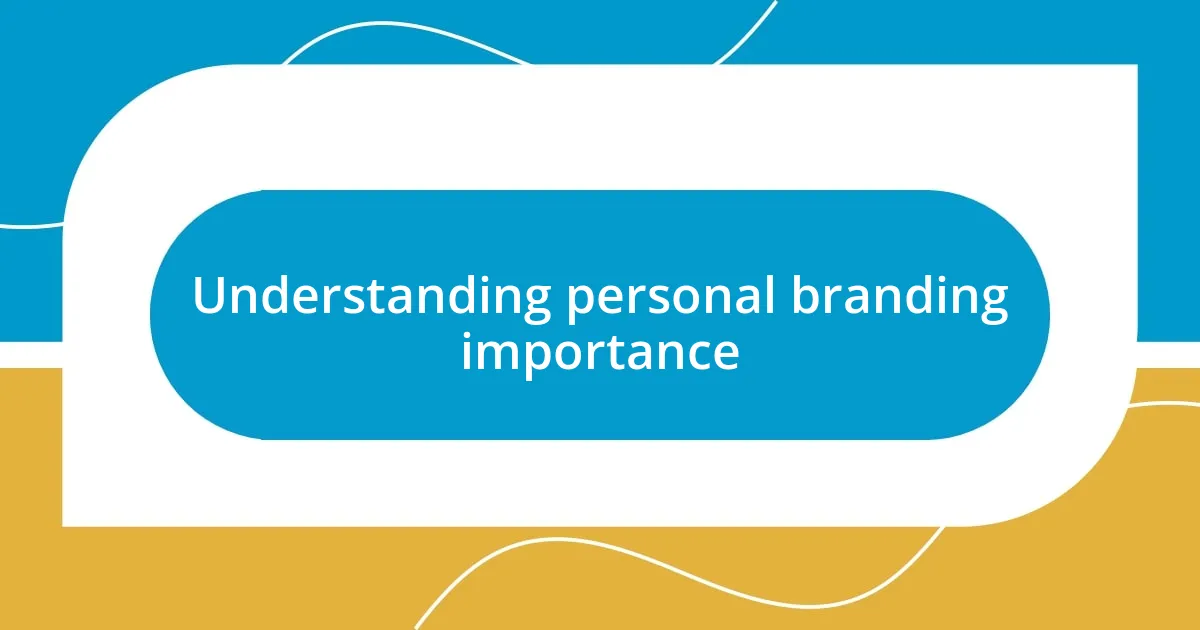
Understanding personal branding importance
Personal branding is vital because it shapes how others perceive our professional identity. I remember when I first started my career; I underestimated the power of reputation. A colleague of mine advised me to build my personal brand strategically, and I realized that how I presented myself could open doors I never thought possible.
Consider this: how would you like to be remembered? Personal branding allows us to control that narrative. I once attended a networking event where I met someone who clearly hadn’t paid attention to their brand. They struggled to connect their skills and passions to their identity, and I could see how it affected their confidence and interactions.
Building a strong personal brand not only influences how others view us but also boosts our self-esteem. I can recall moments when sharing my journey and values with others felt incredibly rewarding. Every time I shared my unique experiences, it reinforced my purpose and passion, making my professional interactions much more meaningful. Have you thought about how your personal brand impacts your daily encounters?
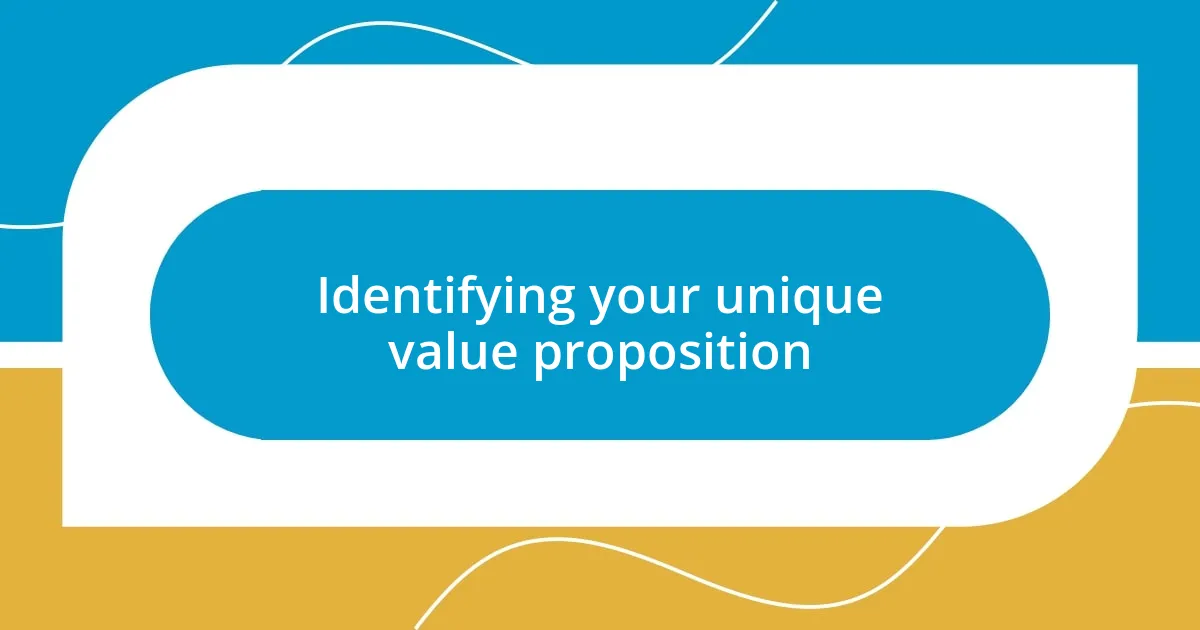
Identifying your unique value proposition
Identifying your unique value proposition is crucial in building a compelling personal brand. It’s about understanding what sets you apart in a sea of professionals. I remember refining my own value proposition after reflecting on my experiences, skills, and passions. I took the time to genuinely ask myself: what do I provide that others can’t? That self-reflection not only clarified my goals but also boosted my confidence in networking situations.
To help you discover your unique value proposition, consider these questions:
- What specific skills do you excel at that others in your field may lack?
- What personal experiences have shaped your professional journey?
- How can you combine your expertise with your passions to create something valuable?
- What unique perspective do you bring to your industry?
- How do your values align with the needs of your target audience?
By diving deep into these aspects, you can articulate a value proposition that resonates with both you and your audience.
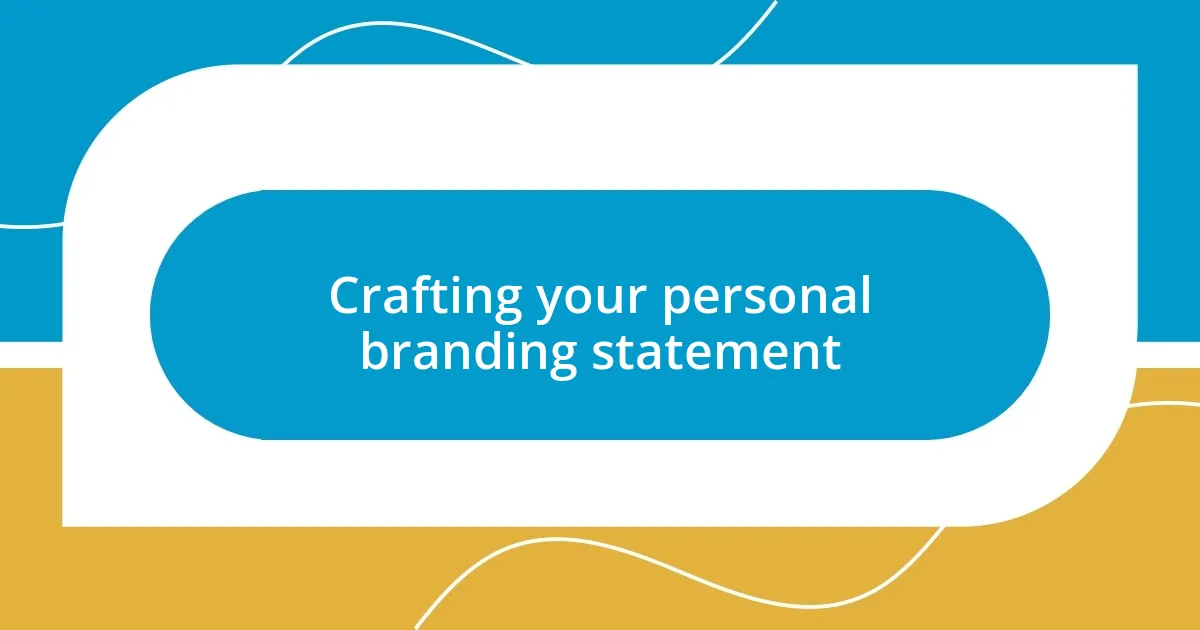
Crafting your personal branding statement
Crafting a personal branding statement is all about expressing who you are in a way that resonates with others. Reflecting on my journey, I remember when I sat down to write mine for the first time. It felt daunting; however, once I distilled my core values and unique strengths into a few powerful sentences, I found clarity. Suddenly, I had a concise narrative that captured my essence—something I could confidently share with others.
A strong personal branding statement isn’t just a sentence; it’s a living reflection of your professional identity. During a mentorship session, I shared my statement with a mentor who challenged me to think deeper. She encouraged me to explore not only what I do but also why I do it. This led me to fine-tune my statement, emphasizing my passion for empowerment – a fundamental part of my brand. I found that incorporating not just skills but also motivations transformed my narrative.
When formulating your personal branding statement, envision a target audience that aligns with your professional goals. I often ask myself: what do I want them to remember after our interaction? This approach helps me craft statements that go beyond surface-level traits. Sharing my experiences or vision not only differentiates me but also creates a connection with others. Engaging them with personal anecdotes is vital—it builds rapport and reinforces the authenticity of my brand.
| Key Elements | Considerations |
|---|---|
| Clarity | Be concise and straightforward in your statement. |
| Authenticity | Ensure your statement reflects your true self. |

Developing consistent branding across platforms
Creating consistent branding across platforms is essential for building a recognizable personal brand. I recall the early days of my online presence when I felt overwhelmed trying to maintain uniformity across my social media channels. It was a challenge, but I discovered that keeping a consistent profile picture, color scheme, and tone of voice not only made my brand memorable but also instilled a sense of trust with my audience. Have you ever tried to connect with someone online only to find they seem like a completely different person on each network? That lack of consistency can create confusion.
Moreover, it’s important to align your messaging with the goals of each platform. For instance, I share more professional insights on LinkedIn, while Instagram allows for a more personal glimpse into my life and interests. Initially, I struggled with how to balance personal stories with professional content, but I realized that weaving my personality into my branding gives depth to my message. I often ask myself, “How can I uniquely show up in each space while staying true to my core identity?” This reflection has been vital in sharpening my approach.
Lastly, engaging with your audience is key. I’ve learned that responding to comments and messages consistently, while maintaining a similar tone, helps strengthen my brand across platforms. I once had a follower tell me they felt like they knew me better because of how I interact online. That feedback made me appreciate the value of a cohesive brand presence. It’s about creating a trustworthy environment where people can connect with the real you, regardless of the platform.
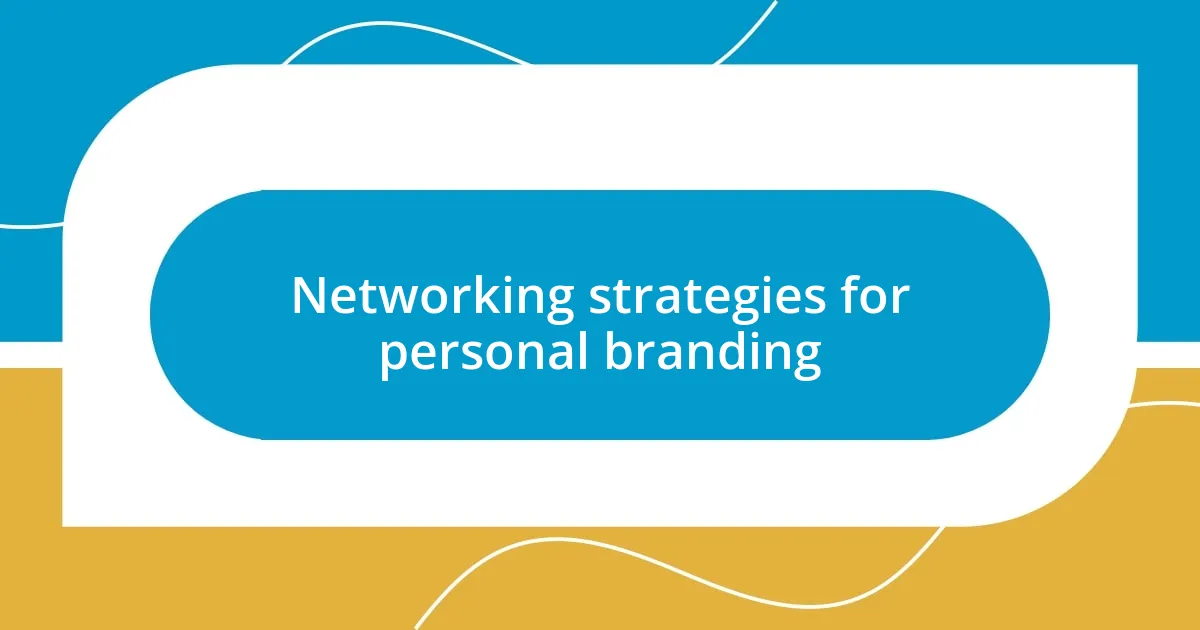
Networking strategies for personal branding
Networking is crucial for enhancing your personal brand, and I’ve found that striking up conversations authentically makes a world of difference. At a recent industry conference, I stepped out of my comfort zone to approach someone whose work I admired. I simply asked about their thoughts on a recent trend. This led to a deeper discussion where I shared my journey, and ultimately, we connected over shared values. It’s amazing how one genuine conversation can open doors to collaboration and opportunities.
Building a network is not just about collecting contacts, but forming meaningful relationships. I vividly remember a time when I followed up with a fellow entrepreneur after a workshop. Instead of a bland “nice to meet you” message, I referenced something specific from our chat, which reignited our conversation. This personal touch not only made me memorable but also built a rapport that evolved into a mutually supportive partnership. Have you ever thought about what makes your follow-ups stand out? A simple, thoughtful gesture can elevate your personal brand.
Additionally, leveraging social media for networking has dramatically shaped my brand. I actively engage with industry leaders on platforms like Twitter and LinkedIn, sharing insights and asking questions that prompt meaningful dialogues. I often reflect on how these interactions have led to unexpected mentorships and collaborations. When did you last engage with someone in your field online? I find that being proactive in networking, rather than waiting for connections to happen, can truly boost your personal brand’s visibility and credibility.
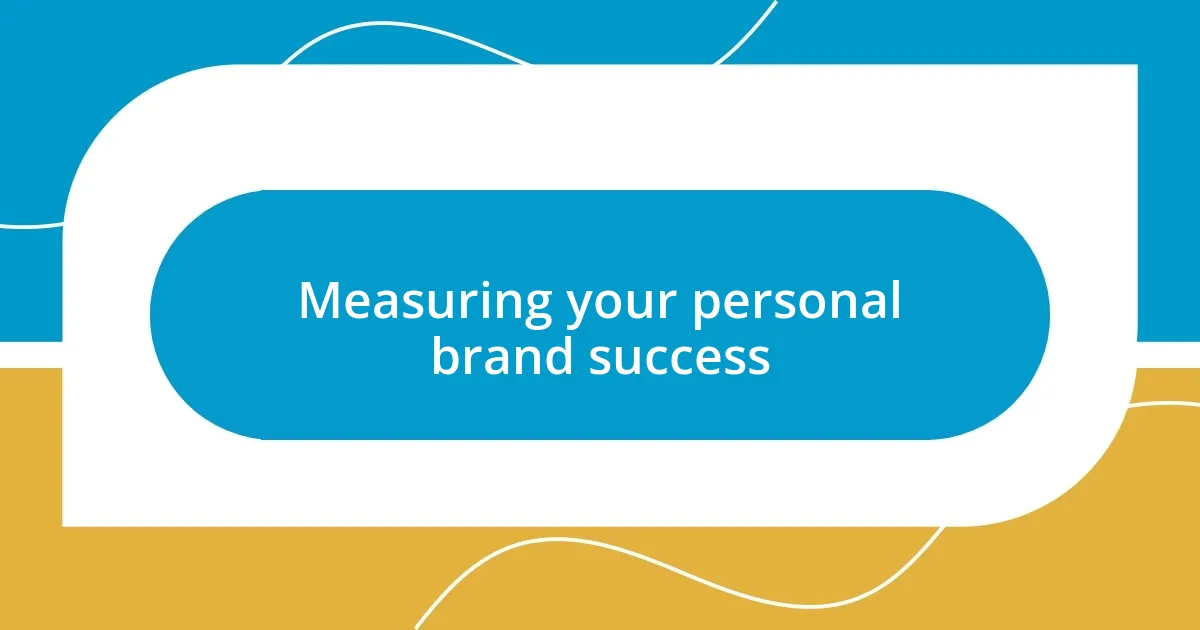
Measuring your personal brand success
Measuring the success of your personal brand involves looking at various metrics that reflect your reach and impact. For instance, I like to track engagement rates on my social media posts. It’s not just about the number of likes; the comments and shares tell me more about how my audience resonates with my message. Have you ever noticed how a single post can spark a lively discussion while another one fades away? That’s when I realize which topics truly connect with people and align with my brand’s essence.
Another key indicator for me has been the growth of my network. I remember the moment I hit 1,000 followers on LinkedIn; it was exhilarating and felt like a validation of my efforts. But what excites me even more is the quality of those connections. Are they industry professionals, influencers, or potential collaborators? I often ask myself, “Am I attracting the type of people I want to engage with?” Evaluating my network and how it evolves is crucial in assessing my personal brand’s effectiveness.
Lastly, feedback plays a pivotal role in my personal brand evaluation. Recently, a colleague commended me on my storytelling ability during a workshop. That simple acknowledgment affirmed that my brand’s voice was clear and impactful. It’s these moments that remind me of my growth journey. I encourage you to seek feedback actively; the insights can guide you in fine-tuning your brand. What have others said about how they perceive your brand? Reflecting on this can spark valuable adjustments and new directions.














